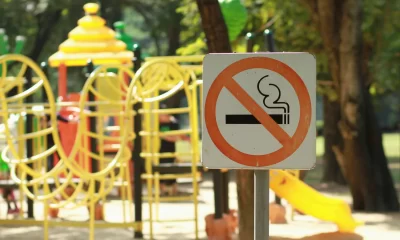Business
Russia Signals That Griner Could Be Released, But U.S. Skeptical

The deputy foreign minister of Russia cited new “activity” in the WNBA star’s case.
A top official in Russia suggested last week that the American basketball star Brittney Griner’s detention could be approaching a resolution, but officials in the United States quickly dismissed those claims.
Sergei Ryabkov, Russia’s deputy foreign minister, said on Friday that there was fresh “activity” surrounding a potential prisoner swap involving Griner, who was transferred to a Russian penal colony earlier this month, and Viktor Bout, the Russian arms dealer currently serving a 25-year prison sentence in the United States.
Ryabkov’s comments were quoted in Russian media.
“We haven’t found common ground yet, but, undoubtedly, Viktor Bout is among those being discussed and obviously we are hoping for a positive result,” Ryabkov said, as reported on by ESPN. “The Americans are showing certain activity and we are working on this through appropriate channels.”
But the State Department splashed cold water on that, saying that Russia has not been a serious party to the negotiations.
“We are not going to comment on the specifics of any proposals other than to say that we have made a substantial offer that the Russian Federation has consistently failed to negotiate in good faith,” a State Department spokesperson said, as quoted by ESPN. “The U.S. Government has continued to follow up on that offer and propose alternative potential ways forward with the Russian government. The Russian government’s failure to seriously negotiate on these issues in the established channel, or any other channel for that matter runs counter to its public statements.”
The U.S. has proposed a prisoner swap with Russia that would secure the release of both Griner and Paul Whelan, a United States citizen who has been held in Russia since 2018 on espionage charges, in exchange for Bout. But so far, a deal has yet to materialize.
Griner, a star for the Phoenix Mercury of the WNBA, has been detained in Russia since February, when she was arrested in a Moscow airport on drug charges (officials found cannabis oil in her luggage).
Griner pleaded guilty to the charges in July, but said it was a mistake and that she did not intend to break the law. In August, Griner was convicted by a Russian court, which sentenced her to nine years in prison.
Last month, the court denied Griner’s appeal.
Earlier this month, Griner’s lawyers confirmed that their client had been transferred to a Russian penal colony.
U.S. officials met with Griner earlier this month for the first time since her arrest in February, when she was returning to Russia to play for UMMC Ekaterinburg, a team for which which she has played during the WNBA’s offseason since 2014.
“We are told she is doing as well as can be expected under the circumstances,” the White House press secretary, Karine Jean-Pierre said regarding the meeting.
“As we have said before, the U.S. government made a significant offer to the Russians to resolve the current unacceptable and wrongful detentions of American citizens Brittney Griner and Paul Whelan,” Jean-Pierre added. “I can also tell you that in the subsequent weeks, despite a lack of good faith negotiation by the Russians, the U.S. government has continued to follow up on that offer and propose alternative potential ways forward with Russians through all available channels.
President Joe Biden, who met with Griner’s family members in September, said in a news conference following the midterm election earlier this month that he is hopeful Russian President Vladimir Putin will be willing to negotiate a release.
“My hope is that now that the election is over, that Mr. Putin will be able to discuss with us and be willing to talk more seriously about a prisoner exchange,” Biden said.
Source: https://hightimes.com/news/russia-signals-that-griner-could-be-released-but-u-s-skeptical/
Business
New Mexico cannabis operator fined, loses license for alleged BioTrack fraud

New Mexico regulators fined a cannabis operator nearly $300,000 and revoked its license after the company allegedly created fake reports in the state’s traceability software.
The New Mexico Cannabis Control Division (CCD) accused marijuana manufacturer and retailer Golden Roots of 11 violations, according to Albuquerque Business First.
Golden Roots operates the The Cannabis Revolution Dispensary.
The majority of the violations are related to the Albuquerque company’s improper use of BioTrack, which has been New Mexico’s track-and-trace vendor since 2015.
The CCD alleges Golden Roots reported marijuana production only two months after it had received its vertically integrated license, according to Albuquerque Business First.
Because cannabis takes longer than two months to be cultivated, the CCD was suspicious of the report.
After inspecting the company’s premises, the CCD alleged Golden Roots reported cultivation, transportation and sales in BioTrack but wasn’t able to provide officers who inspected the site evidence that the operator was cultivating cannabis.
In April, the CCD revoked Golden Roots’ license and issued a $10,000 fine, according to the news outlet.
The company requested a hearing, which the regulator scheduled for Sept. 1.
At the hearing, the CCD testified that the company’s dried-cannabis weights in BioTrack were suspicious because they didn’t seem to accurately reflect how much weight marijuana loses as it dries.
Company employees also poorly accounted for why they were making adjustments in the system of up to 24 pounds of cannabis, making comments such as “bad” or “mistake” in the software, Albuquerque Business First reported.
Golden Roots was fined $298,972.05 – the amount regulators allege the company made selling products that weren’t properly accounted for in BioTrack.
The CCD has been cracking down on cannabis operators accused of selling products procured from out-of-state or not grown legally:
- Regulators alleged in August that Albuquerque dispensary Sawmill Sweet Leaf sold out-of-state products and didn’t have a license for extraction.
- Paradise Exotics Distro lost its license in July after regulators alleged the company sold products made in California.
Golden Roots was the first alleged rulebreaker in New Mexico to be asked to pay a large fine.
Source: https://mjbizdaily.com/new-mexico-cannabis-operator-fined-loses-license-for-alleged-biotrack-fraud/
Business
Marijuana companies suing US attorney general in federal prohibition challenge

Four marijuana companies, including a multistate operator, have filed a lawsuit against U.S. Attorney General Merrick Garland in which they allege the federal MJ prohibition under the Controlled Substances Act is no longer constitutional.
According to the complaint, filed Thursday in U.S. District Court in Massachusetts, retailer Canna Provisions, Treevit delivery service CEO Gyasi Sellers, cultivator Wiseacre Farm and MSO Verano Holdings Corp. are all harmed by “the federal government’s unconstitutional ban on cultivating, manufacturing, distributing, or possessing intrastate marijuana.”
Verano is headquartered in Chicago but has operations in Massachusetts; the other three operators are based in Massachusetts.
The lawsuit seeks a ruling that the “Controlled Substances Act is unconstitutional as applied to the intrastate cultivation, manufacture, possession, and distribution of marijuana pursuant to state law.”
The companies want the case to go before the U.S. Supreme Court.
They hired prominent law firm Boies Schiller Flexner to represent them.
The New York-based firm’s principal is David Boies, whose former clients include Microsoft, former presidential candidate Al Gore and Elizabeth Holmes’ disgraced startup Theranos.
Similar challenges to the federal Controlled Substances Act (CSA) have failed.
One such challenge led to a landmark Supreme Court decision in 2005.
In Gonzalez vs. Raich, the highest court in the United States ruled in a 6-3 decision that the commerce clause of the U.S. Constitution gave Congress the power to outlaw marijuana federally, even though state laws allow the cultivation and sale of cannabis.
In the 18 years since that ruling, 23 states and the District of Columbia have legalized adult-use marijuana and the federal government has allowed a multibillion-dollar cannabis industry to thrive.
Since both Congress and the U.S. Department of Justice, currently headed by Garland, have declined to intervene in state-licensed marijuana markets, the key facts that led to the Supreme Court’s 2005 ruling “no longer apply,” Boies said in a statement Thursday.
“The Supreme Court has since made clear that the federal government lacks the authority to regulate purely intrastate commerce,” Boies said.
“Moreover, the facts on which those precedents are based are no longer true.”
Verano President Darren Weiss said in a statement the company is “prepared to bring this case all the way to the Supreme Court in order to align federal law with how Congress has acted for years.”
While the Biden administration’s push to reschedule marijuana would help solve marijuana operators’ federal tax woes, neither rescheduling nor modest Congressional reforms such as the SAFER Banking Act “solve the fundamental issue,” Weiss added.
“The application of the CSA to lawful state-run cannabis business is an unconstitutional overreach on state sovereignty that has led to decades of harm, failed businesses, lost jobs, and unsafe working conditions.”
Business
Alabama to make another attempt Dec. 1 to award medical cannabis licenses

Alabama regulators are targeting Dec. 1 to award the first batch of medical cannabis business licenses after the agency’s first two attempts were scrapped because of scoring errors and litigation.
The first licenses will be awarded to individual cultivators, delivery providers, processors, dispensaries and state testing labs, according to the Alabama Medical Cannabis Commission (AMCC).
Then, on Dec. 12, the AMCC will award licenses for vertically integrated operations, a designation set primarily for multistate operators.
Licenses are expected to be handed out 28 days after they have been awarded, so MMJ production could begin in early January, according to the Alabama Daily News.
That means MMJ products could be available for patients around early March, an AMCC spokesperson told the media outlet.
Regulators initially awarded 21 business licenses in June, only to void them after applicants alleged inconsistencies with how the applications were scored.
Then, in August, the state awarded 24 different licenses – 19 went to June recipients – only to reverse themselves again and scratch those licenses after spurned applicants filed lawsuits.
A state judge dismissed a lawsuit filed by Chicago-based MSO Verano Holdings Corp., but another lawsuit is pending.
Source: https://mjbizdaily.com/alabama-plans-to-award-medical-cannabis-licenses-dec-1/
-

 Business2 years ago
Business2 years agoPot Odor Does Not Justify Probable Cause for Vehicle Searches, Minnesota Court Affirms
-

 Business2 years ago
Business2 years agoNew Mexico cannabis operator fined, loses license for alleged BioTrack fraud
-

 Business2 years ago
Business2 years agoAlabama to make another attempt Dec. 1 to award medical cannabis licenses
-

 Business2 years ago
Business2 years agoWashington State Pays Out $9.4 Million in Refunds Relating to Drug Convictions
-

 Business2 years ago
Business2 years agoMarijuana companies suing US attorney general in federal prohibition challenge
-

 Business2 years ago
Business2 years agoLegal Marijuana Handed A Nothing Burger From NY State
-

 Business2 years ago
Business2 years agoCan Cannabis Help Seasonal Depression
-

 Blogs2 years ago
Blogs2 years agoCannabis Art Is Flourishing On Etsy













